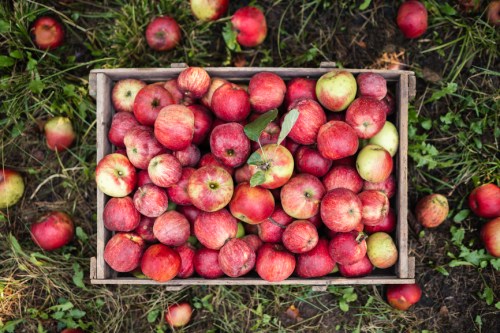5 Apple Storage Tricks That Will Keep Your Honeycrisps ‘Crisp’ All Season Long, From a Food Scientist
Find easy apple storage tips that help keep your seasonal apple haul fresh for weeks to come from an expert. Plus, how to freeze apples.

Depending on who you ask, there’s no more quintessential autumnal food than the apple. (Pumpkin spice latte lovers, I see you, too.) Whether you make an outing out of apple picking with friends or simply stock up on a bag during your weekly grocery haul, you might have quite a few Honeycrisps, McIntoshes, or Pink Ladies on hand. Now, the goal is to get them to last long enough so you can enjoy every last one… but how do you go about doing that, exactly?
Experts in This Article
virologist and senior director of food technology communications at International Food Information Council
Ahead, you’ll find all the apple storage tips and tricks you might have been sleeping on for many autumns past. Tamika Sims, PhD, senior director of food technology communications at the International Food Information Council (IFIC), leads the way.
5 apple storage tips that will help keep your fall haul fresh for ages
1. Refrigerate apples for longevity
Some of us have preferences for the temperature of our go-to foods and drinks. That said, you *can* leave your apples in a tabletop fruit basket if you’re not a fan of chilled foods (and it’s A-okay to keep them out at least until they’re fully ripe). However, Dr. Sims cautions that they won’t last as long at room temperature. This method offers a shelf life of only two to three weeks, she shares, while refrigeration allows your bounty to stay fresh for approximately five weeks—or even as long as two months. “Specifically, many refrigerators have a crisper drawer that is optimal for storing fruit,” she continues. Be sure to put it to use.
2. Keep ethylene at bay
Apples are among the highest producers of ethylene, an odorless, gaseous ripening agent that many produce items release. It’s when that gas is released that your favorite fruits and veggies start to wilt, spot, or otherwise lose their edibility. Apples don’t only produce ethylene (with varieties like McIntosh producing “prodigious amounts”); they’re also highly sensitive to it. Low temperatures help reduce ethylene sensitivity, hence why refrigerating permits your apples to last significantly longer than the alternative.
You should also store your apples away from other high-ethylene producers, which include other fridge-friendly produce like pears, peppers, cantaloupe, and kiwi. Before they chill out in the crisper, separate them from better-for-countertop ethylene producers, including bananas and tomatoes.
You should also store your apples away from other high-ethylene producers, which include other fridge-friendly produce like pears, peppers, cantaloupe, and kiwi.
3. Be selective if slicing
Some tend to find an apple more enjoyable when it’s sliced versus whole. If you’re in that camp, aim to cut your apples only before you plan to enjoy them. But in case you have a few slices left over that you don’t want to waste, bag them up and put them in the fridge ASAP.
Apple slices will inevitably go brown pretty quickly, but Dr. Sims says that this process doesn’t mean that they’re inedible; they’ll just be a bit unsightly. “The browning of the apple flesh is a natural process that happens and isn’t linked to quality,” she clarifies. Still, she offers a helpful hack to help you get around this in case you’re saving your slices for at least a few more hours or until the next day: squeezing a dash of lemon or lime on them, which delays enzymatic browning.
4. Freeze your apples
In case you have a ton of apples at home and don’t think you’ll be able to make a dent on them in the weeks ahead, you can always freeze them. “They need to be washed, peeled, and cored to prep for freezing,” Dr. Sims shares, estimating that they can stay fresh this way for up to eight months.
5. Bake, then refrigerate
Baking up an apple pie and have leftovers? Dr. Sims has some additional insights for you. “Apple pie can stay fresh for one to two days at room temperature, but the pie should be covered or kept in a container,” she shares. However, storing your apple pie in the refrigerator is superior, as it can stay fresh for about a week’s time. “You can also freeze the pie in a freezer bag or airtight container to keep the pie fresh for seven to eight months,” she adds.
“[Apples] need to be washed, peeled, and cored to prep for freezing,” Dr. Sims shares, estimating that they can stay fresh this way for up to eight months.
Final tips to prep your apples
Now that you’re equipped with the best ways to store apples for peak freshness, Dr. Sims wants to ensure that you prep them well, too. Of course, you’ll need to clean them.
“Apples, along with other fruits and vegetables, just need to be rinsed with clean running water,” says Dr. Sims. “Accessing clean water is the first step in safely eliminating any contaminants—including dirt and microbes such as Salmonella and Campylobacter, which can cause foodborne illness.” Depending on the quality of your tap water, you may choose to use filtered water to rinse off your apples before drying them with a clean (paper or reusable) towel and enjoying them. Dr. Sims says that you can always remove damaged or bruised areas before digging in, which is paramount to simply tossing the whole fruit. However, “Any fruit that is showing signs of mold or spoilage should be tossed,” she advises.
Finally, the food safety expert clarifies one misconception: that it’s safer to wash fruits with soap. “Soaps and detergent can be unsafe and expose you to chemicals that are not meant to be ingested,” she cautions.
Sign Up for Our Daily Newsletter
Get all the latest in wellness, trends, food, fitness, beauty, and more delivered right to your inbox.
Got it, you've been added to our email list.










